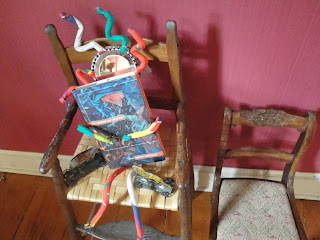This morning I read “Literature and the psychology lab” by
Gregory Currie, a professor of philosophy at the University of Nottingham. Among other things, he suggests that writers may be not more but less reliable than others at
understanding the minds of others because they are so often a tad schizoid or bi-polar,
an increasingly common way of investigating the artist these days. He believes that
literature in general is not such a great measure of human understanding and
that human imagination is not very accurate—even that creators don’t actually
care much about other people, a thing I find manifestly wrong when looking in
my own heart. (I note, as he does, that the research on writers and psychology
he cites comes from male writers.)
Having come from neurologically strange stock myself, I find
these sorts of arguments to be interesting but not very useful. Yes, someone
with a dash of something or other may be looser on the mental leash that others
are, may have access to rather different ways of thinking and, more importantly,
to different ways of clicking words together. I may have had what is called a “splash”
of something myself, having been notable as a child for a scissors phobia that
eventually gave me hair that could tickle the backs of my knees when unbraided,
an extreme aversion to tags and often seams, an ability to talk in paragraphs
before the age of one but delayed walking (luckily I could tell people where I
wanted to go), odd food proclivities (obsessed with raw veggies, I was an early
raw foodist), etc. I certainly had a deep rage to read that caused me to read
everywhere and at all times (a young mistress of how to read during class.)
We still live in an age when educators insist on justifying
literature and finding a “reason” and purpose for art and when researchers are
constantly whittling away at the artist’s “authority” as a voice for his or her
fellows and times. I am afraid that I
don’t care a whit for these sorts of difficulties. They mean very little to me,
even though I could make a perfectly fine argument for the tragedy of Oedipus as having great meaning and purpose, showing us the deep need for repentance and that
even the most ignorant of evils must be accepted and borne and by the doer. But all these avenues for discussion are
lesser ways of talking about art, and they are insufficient for any artist.
Writers do sometimes talk about literature this way, but writers often say
silly things in audio interviews. If you want to ask a writer something, hand a
question to him on a piece of paper or send it by email.
When I make something, it is because I am absolutely in love
with the sensation of words rising from the fount and flooding through me,
sluicing and driving, carrying me away, out of myself and into a larger and
brighter realm. The intense and piercing
joy of making and word-twisting is what draws me on, what makes me sacrifice a good portion of my
life to sitting in poky corners tapping at machines. And you know, I still hew
close to the ancient idea that beauty, truth, and the often betrayed need for purity
of soul (i.e. goodness) shine through the best works.
Perhaps I am a little bit mad, although I would be surprised
to find it so: since about the age of thirty, I have lived a fairly quiet and perfectly
ordinary life, the sort of life one needs to live in order to write. Like many
people in the 21st century, I am often too busy. I have all the
usual demands of a mother of three, and I meet them as they come, just like
other women. I try to help my publishers by doing events and publicizing my books, and
like most other writers, I wish that the books would just sell themselves so that
I could have more time to write.
At the same time, I am doing something that pushes against
the norm and is counter to the rather trivial, noisy, game-like culture of our
day. I am accreting the pearl of what I
call my soul (you may call it whatever you like), in great part by making poems
and novels, lapping nacre over the grit of my life. And in defiance of Professor
Currie (forgive me, my book-loving professor!), I would say that far from not
caring about other people, I consider everything I have made as a gift tossed
into the sea of humankind. (Admittedly, they sometimes pay for that gift, and I am grateful to those those who by doing so vote for the continued publication of my work, supporting me and my publisher.) It makes me glad when people fish up one of my poems or stories or novels and like it and say so. I often have a strong feeling for people I have never
met and may never meet because I know that they have walked with me through forests
or city streets, just as surely as if we were the dearest of friends and had
gone for a “real” walk, hand in hand.
